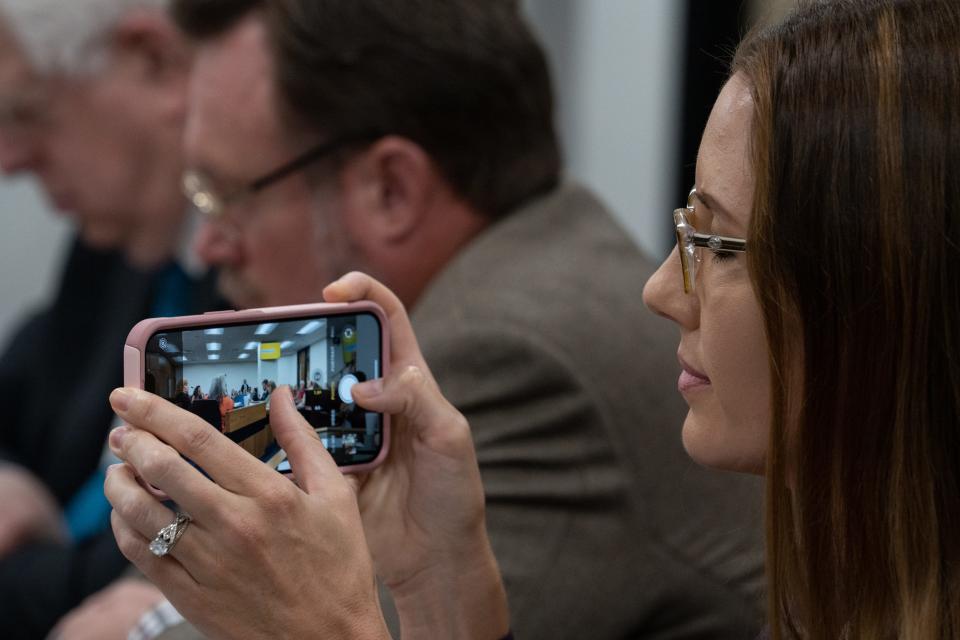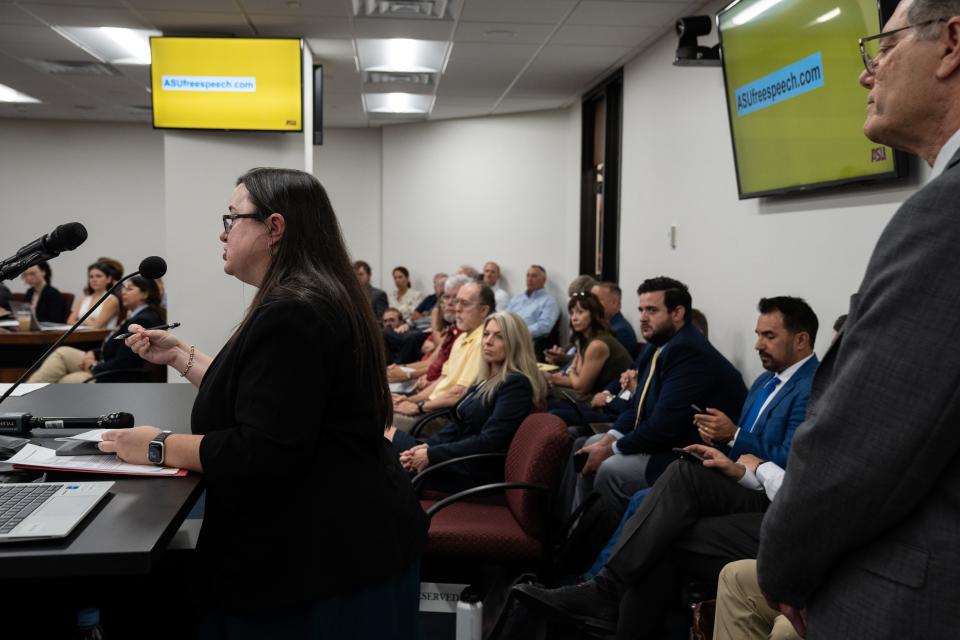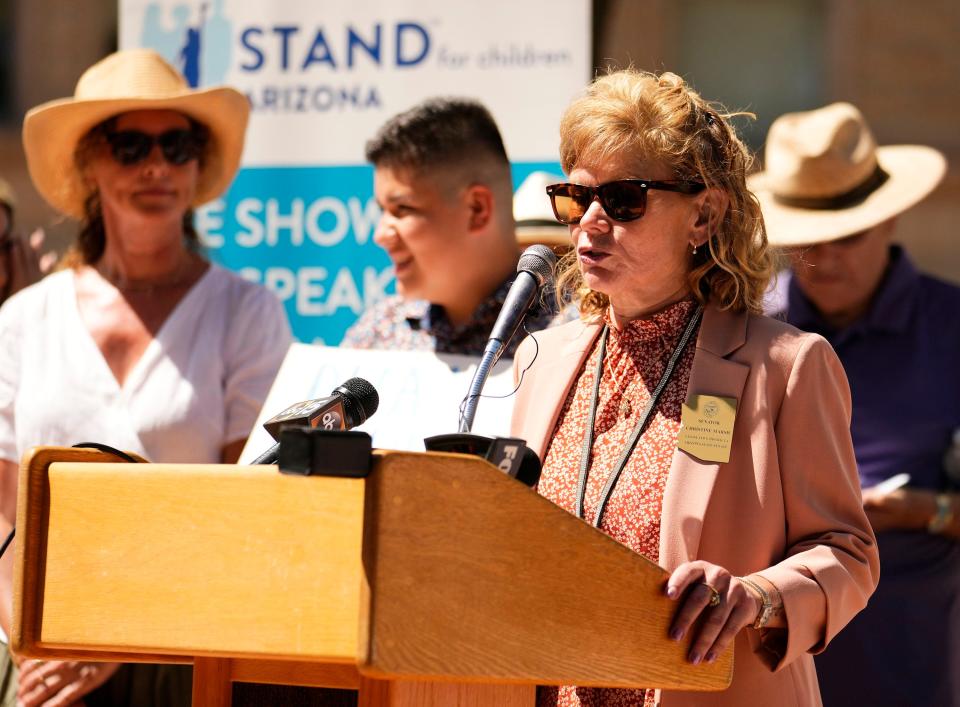Genuine 'free speech crisis' or 'a performance'? State lawmakers probe ASU incident
- Oops!Something went wrong.Please try again later.
- Oops!Something went wrong.Please try again later.
The first meeting of a Republican-led legislative committee to investigate free expression at Arizona’s public universities either addressed an instance where “free speech was stifled” or served as “a performance,” depending on whether you ask Republican Sen. Anthony Kern or Democratic Rep. Analise Ortiz.
By its end, just one thing was clear — Republican lawmakers won’t be letting up anytime soon on Arizona State University officials.
“I don’t trust our universities — just, period,” said Kern, who co-chaired the committee. “They do not teach our students well-rounded dialogue so that the student can make the decision on how they want to think and the direction in life they want to take.”
The formation of the committee came just weeks after Ann Atkinson, the former director of an Arizona State University center promoting personal development and conservative values, publicly alleged that she lost her job after bringing several right-wing speakers to campus in February for an event titled "Health, Wealth and Happiness."

The event included speeches from Turning Point USA founder Charlie Kirk, as well as Robert Kiyosaki, founder of a personal finance education company and author of "Rich Dad, Poor Dad," and Dennis Prager, host of a conservative talk radio show.
On Tuesday, Atkinson told lawmakers she experienced “condemnation, censorship and chilling of speech” during her time at the university.
“This situation embodies a free speech crisis woven into the maroon and gold fabric of the university,” Atkinson said.
The university has strongly denied her claims, saying the T.W. Lewis Center shut down because the donor who created and funded it, Tom Lewis, pulled his financial contribution. The February event was held and well-attended by students, according to the university, and the speaker series and classes created by the center have continued at ASU since its closure.
Nearly every event is an opportunity for protest, but the university did its job in staying neutral and allowing everyone to be heard, ASU Executive Vice Provost Pat Kenney told the committee.
“It can be noisy and uncomfortable — typical for a democracy — but the events will take place,” he said.
The Arizona Board of Regents agrees, according to a letter the board's executive director, John Arnold, sent to Rep. Austin Smith, R-Wittmann, after Smith inquired about campus speech issues. The board is the governing body of the state's public universities.

"After review, this incident appears to be a series of examples of unfettered free speech on the ASU campus," Arnold wrote.
But the conclusions offered so far by ASU and the board have not convinced Republican lawmakers, who dominated the committee six to four. Kern, of Glendale, said he's requesting that ASU produce a written investigation into the matter and a list of proposed actions within 60 days. The Senate Judiciary Committee, he said, will act based on "the thoroughness of that report."
ASU will fulfill Kern's request, according to a university spokesperson, Chris Fiscus.
"The university appreciates the opportunity to clarify what occurred and will be responsive to the request of the ad hoc committee," Fiscus said.
Meanwhile, Democratic lawmakers characterized the meeting as "outlandish political theater." After hearing the testimony, they said it is clear nobody's rights were infringed.
"I think that if we want to have a valid, honest conversation about what free speech looks like on a college campus, that’s what we should be having," said Sen. Christine Marsh, D-Phoenix. "This wasn’t it."

Atkinson said she was "grateful" for the opportunity to speak before the lawmakers. But she wouldn't fully commit to trusting the results of an ASU or legislative investigation.
"There are many ways investigations can go," Atkinson said.
Conservative lawmakers: Faculty letter chilled student attendance
The meeting on Tuesday lasted five hours. Much of the discussion focused on a letter protesting Kirk's appearance in Tempe. The letter was signed by nearly 40 faculty of ASU's honors college, which housed the T.W. Lewis Center.
That letter, some conservative lawmakers argued, had a chilling effect on students who may have wanted to attend the event. Atkinson said students who wished to attend the talk would've had to walk by protesting professors on the way into the building.
“You have faculty members literally standing outside with signs," Kern said. "Isn’t that an intimidation factor?"
ASU officials said they've received no official complaints from any students alleging that a professor forced them into staying home.
"If a professor at ASU coerced a student, that would be a serious matter that we would address," said Deputy General Counsel Kim Demarchi.
Democratic lawmakers acknowledged faculty members — none of whom were present at the meeting — were merely exercising their own free speech rights. Kern said at least two faculty members who signed the protest letter were directly invited to the meeting.
"Free speech sometimes comes with consequences," Marsh said.
Lawmakers debate hate speech, threats
Portions of the meeting were dominated by conflict between Republican and Democratic lawmakers.
At one point, Kern and Sen. Sally Ann Gonzalez, D-Tucson, got into a back-and-forth over whether the ideas that Kirk and other speakers at the February event espouse constitute hate speech. The debate ended with Kern pulling out a pocket version of the U.S. Constitution and reading the First Amendment.
“Hate speech is really free speech, in my opinion,” Kern said.
The First Amendment makes no general exception for offensive or hateful speech, however, hate speech can fall outside the boundaries of protected speech if it qualifies as incitement or a true threat, according to the Foundation for Individual Rights and Expression, an organization that advocates for more freedom of speech on college campuses. Speech is also unprotected if it causes an immediate breach of the peace, such as falsely shouting "fire" in a crowded theater.
Similarly, an argument ensued when Marsh said that ASU faculty members may not have attended the legislative meeting because they received death threats for opposing Kirk's talk. Kern said threats go “with the territory” and that he has also received them.
Later, Prager, who spoke at the meeting, specifically singled out faculty members who signed the protest letter, naming them and ridiculing their research.
After a half-hour lunch break, Kern read out a tweet from Ortiz, of Phoenix, that characterized the meeting as a "waste of time" and taxpayer money, as well as a quote from the Arizona Senate Democrats that called him "absolutely despicable" for his comments on hate speech.
“I’m reading these to say this: This is not about me," Kern said. "I know somebody had mentioned it being a show … this is about the students and what is being taught in our universities."
All three of Arizona's public universities — ASU, University of Arizona and Northern Arizona University — boast "green light" speech ratings from the Foundation for Individual Rights and Expression.
The foundation annually analyzes the policies that regulate student expression at nearly 500 colleges and universities across the country, with the "green light" rating being the highest a school can receive.
Sasha Hupka covers higher education for The Arizona Republic. Do you have a tip on Arizona's universities, community colleges or trade schools? Reach her at sasha.hupka@arizonarepublic.com. Follow her on Twitter: @SashaHupka.
This article originally appeared on Arizona Republic: Arizona lawmakers probe free speech on campus after ASU after event

